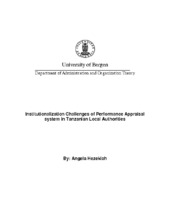Institutionalization challenges of performance appraisal system in Tanzanian local government authorities
Master thesis
Permanent lenke
https://hdl.handle.net/1956/6071Utgivelsesdato
2012-06-05Metadata
Vis full innførselSamlinger
- Department of Government [457]
Sammendrag
Improving the service provision of the public sector has been the struggle of many developing countries for the past two decades. Tanzania is also in the same endeavor where it aims to improve the performance of the public servants so as to improve service delivery in the public sector. It is with this intention that performance appraisal system was introduced to the local authorities, which are the service provider entities of the government. This study has been an attempt to assess the challenges of instituting PAS in the local authorities; focusing on two LGA's namely Arusha City Council and Arusha district Council. The two authorities were studied to ascertain any differences between rural and urban local authorities. The study was qualitative and data was obtained through in-depth interview, focused group discussion, observation and documentary review. It involved 34 respondents who were purposefully (heads of departments) and randomly (lower cadre) selected. Generally, it was found that there is very low institutionalization of PAS in LGA's due to some cultural, organizational and political factors. The findings have shown no significant differences between the two LGA's and that the public servants in these councils have inadequate knowledge on the purpose and processes of PAS, leading to a disregard of performance as a criteria during administrative decision making. The findings show a lack of commitment from the implementers and insufficient financial resources to facilitate the institutionalization of PAS. Furthermore, the study identified power distance and uncertainty avoidance as the major deterrents to institutionalization of PAS in local authorities in Tanzania. On these grounds my conclusion is that there is a need to alter the adapted reforms to conform to Tanzanian culture in order to enable the public servants to identify with them.
